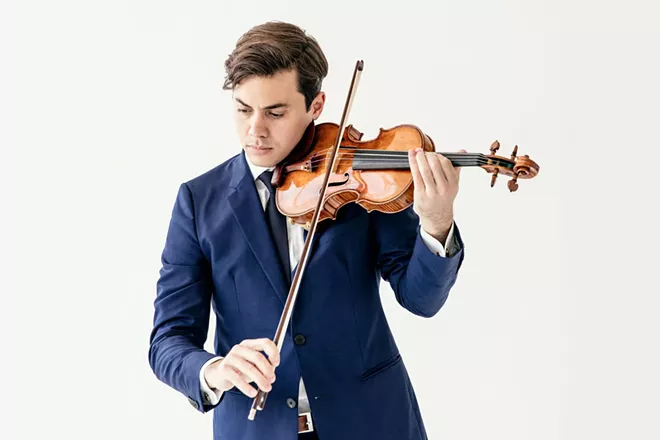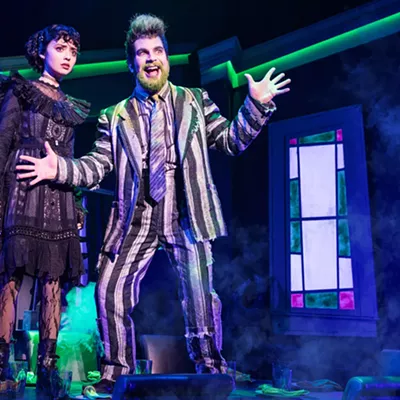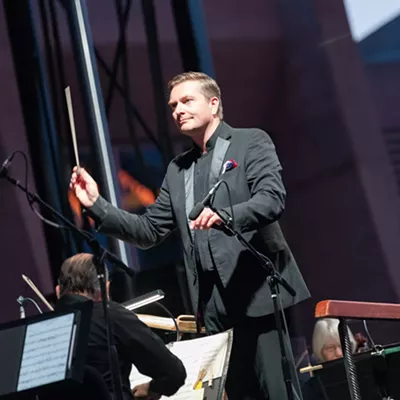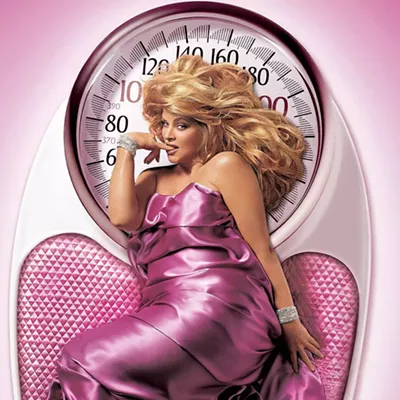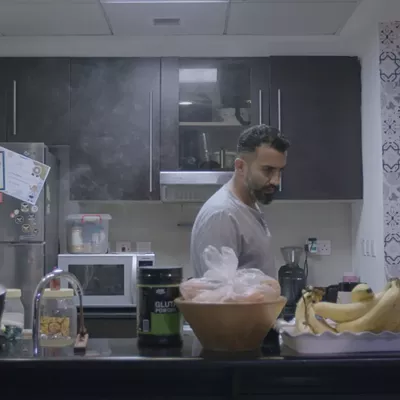It's been six years since the violinist Benjamin Beilman was last in Spokane, but he remembers that 2017 performance of Pyotr Ilyich Tchaikovsky's Violin Concerto all too well. Or at least a few fraught moments of it.
"That was one of the few times where I've actually broken a string on stage," he says. "I was playing a Stradivarius [violin] on loan from a Japanese foundation, and I had to hand my Strad to Mateusz [Wolski], the concertmaster, and I could see his eyes go wide for many reasons. I played the rest of the movement on his violin."
Oddly enough, that wasn't his only mishap during a performance of the Tchaikovsky Violin Concerto. Beilman had a string break recently at a concert in Asia while playing the very same piece.
"Tchaikovsky seems to be the piece that causes me the most heartache," he laughs. "Obviously, it adds to the excitement and the thrill. But in some ways it's a little cursed for me."
For better or worse, Tchaikovsky isn't on the program when Beilman returns to the Fox Theater this weekend for the final Masterworks concert of the Spokane Symphony's 2022-23 season. Amid the program of Béla Bartók's Hungarian Sketches, György Ligeti's Concert Românesc and the 1919 version of Igor Stravinsky's Firebird suite, he'll be performing Johannes Brahms' Violin Concerto — which, like the famous concertos by Tchaikovsky and Jean Sibelius on which Beilman cut his teeth as a young virtuoso — is a foundational piece in nearly every solo violinist's repertoire.
"For every violinist, if they haven't already fallen in love with the violin yet, then that's certainly a piece that really gets them going. It's a piece that really draws the fullest possibility out of the instrument. Brahms envisioned this very much as an interwoven concerto where the violin is in dialogue — or oftentimes in battle — with the orchestral part," Beilman says.
"If I recall, at the premiere, a critic said that the instrument 'was beaten black and blue' in order to try and compete with the orchestra. So that gives you some sense of the level of might you need to bring to the piece."
That quote was actually Austrian music critic Eduard Hanslick's snarky take on the Tchaikovsky Violin Concerto. Hence Beilman's repeated broken strings, perhaps. But the conflation is an easy one to make. The two concertos don't just share a key (D major) and a year of composition (1878); they also push the limits of the instrument and any musician who plays it. Conductor Hans von Bülow purportedly preceded Hanslick's quip by stating that Brahms' concerto was written not for the violin but rather "against the violin."
To Beilman, if Brahms was against anything, it was the idea of pandering to the soloist, even one as respected as the concerto's dedicatee, the superstar violinist Joseph Joachim.
"For a long time, the solo part was meant to be a spotlight, a rose-tinted lens on the individual performer that was supposed to showcase them as a magician or whatever. I think Brahms really wanted to step away from that. He was capable of creating such great, complex art that was not focused on a single person," he says.
But that doesn't mean the concerto strips the soloist of their chance to shine. Joachim's proposed first-movement cadenza made it into the final score, and a good number of other renowned violinists have since offered their own alternate interpretations.
The spirited third movement also calls for some frenetic finger play because it "harkens back to Brahms' upbringing in brothels, playing gypsy music, going on tour with Hungarian violinists," says Beilman.
And yet, for all the concerto's tension and pyrotechnics, he's of the opinion that "there's no more heavenly music" than the middle adagio movement.
"It's hard to pick a favorite, but certainly the movement I find myself gravitating towards most is the second. The second movement starts with a kind of wind serenade, a gentle melody, and then the violin comes in and elaborates on that. The color palette that [Brahms] allows you to draw is just incredible. It's serene, it's beautiful, it's divine, but there are some really touching moments of loneliness and loss in there," he says.
"Brahms apparently was known for a really biting sense of humor. He could cut down even his closest friends with a joke or an insult. You get that sense of attack in the first and even the third movements, but the second movement is where he reveals his inner soul as someone who just wants to be loved."
Even as Beilman himself commissions and performs contemporary compositions like sanguineum (2022) by the Seattle-based composer Gabriella Smith, he continues to find the canonical works like those by Sibelius, Tchaikovsky and Brahms to be emotionally rich and undeniably compelling.
"With this piece, I find the conflict between the solo violin part and the orchestra to be so interesting. There's something to be said about conflict and having to find a way through. It's still, in our ever-changing society, what we experience every single day." ♦
Masterworks 9: Stravinsky's Firebird • Sat, May 13 at 7:30 pm; Sun, May 14 at 3 pm • $19-$68 • The Fox Theater • 1001 W. Sprague Ave. • foxtheaterspokane.org • 509-624-1200

